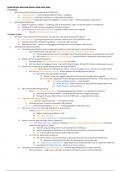CHAPTER 26: WAR AND REVOLUTION (1914-1919)
Pre Chapter
I. WWI connected to ideals, developments of 19th cent
A. Industrialization - increasing standard of living → weapons
B. Imperialism - “civilizing” non-Euros → international conflicts
C. Nationalism - bringing compatriots together in a nation state → hateful prejudice, chauvinism
II. WWI impacts 20th cent
A. Need for supplies, soldiers → suffering, rise of bureaucratic state, increased women in workplaces
B. Collapse of Russian, Austro-Hungarian, Ottoman Empires
C. Russian Revolution of 1917 - Bolsheviks establish radical communist regime
1. Rise of totalitarian fascist mvmts
The Road to War
I. Pre-Notes - What caused the FIrst World War, and why did it have significant popular support?
A. No single cause - growing competition over colonies, markets, arms race, diplomatic crises
B. Populist nationalism strengthening soldiers - “my country right or wrong”
C. Domestic conflicts → govts pursuing aggressive foreign policies to strengthen national unity
II. Growing International Conflict
A. Euro statesmen failed to resolve diplomatic problems from Germany’s rise to Great Power
1. New international relations from Franco-Prussian war, unification of Germany
a) France defeated, Bismarck’s strengthening of Prussia-Germany as most powerful Euro nation
b) BUT claims Germany is a “satisfied power” - had no territorial ambitions, only wants peace
B. Bismarck tries to preserving peace
1. Bismark keeps France diplomatically isolated w/o allies
2. BUT also Austria-Hungary, Russia - had conflicting interests; falling Otto Empire made power vacuum
C. Bismarck’s temporary but great foreign policy accomplishments
1. 1871-1880s Germany still in international affairs - Austria-Hungary, Russia alliance to isolate France
2. BUT William II dismissed Bismarck - didn’t approve of friendly Russian policies
a) Bismarck's alliance system unravels
(1) Doesn’t renew non-aggression pact w/ Russia even though Russia agreed
(2) OUTCOME: republican France beings courting absolutist Russia - offers loans, arms, etc
(a) 1894 France and Russia allies → Euro divided
(i) Triple Alliance - Austria, Germany, Italy; Germany preparing for war
(ii) Dual Alliance - Russia, France
D. GB’s complicated foreign policy
1. Only uncommitted Great Power - “splendid geographical isolation”, no permanent alliances
a) Germany, Brits natural allies? - racially related Germanic, Anglo-Saxon ppls
b) BUT good Prussia, GB relations since mid 18th cent → Anglo-German rivalry
E. Anglo-German rivalry causes
1. 1890s German industrial power → commercial rivalry
2. Germany pursuit of colonies threatens GB interests
3. 1900 Germany expanding battle fleet - challenging GB’s naval supremacy
F. Also South African War btwn GB and Dutch in South Africa
1. Lead to opposition to GB imperialism →
a) Begins improving relations w/ US
b) 1902 Japan alliance
c) 1904 Anglo-French Entente - GB, France alliance
G. German actions against Anglo-Franco closeness
1. 1905 First Moroccan Crisis - William II declares Morocco an independent sovereign state + demands
same trading rights as France
a) Violates long standing French colonial interests in Morocco
b) Wants international conference to settle Moroccan question to Germany’s benefit
c) BUT France, GB closer, Germany left empty handed
2. OUTCOMES: diplomatic revolution
a) GB, France, RUssia, US see Germany as potential threat who wanted to dominate Euro
(1) Germany noticing plots to block its development as world power
b) 1907 Anglo-Russian Agreement - signed by Russia (weakened from war w/ Japan and 1905 rev)
c) Foundation for Triple Entente - GB, Russia, France alliance
H. Germany’s new expensive big-gun battleship fleet + already expanding navy increases tensions
1. German patriots - large navy is the right of a great world power, source of national pride
, 2. British leaders - large navy is a military challenge forcing them to spend “People’s Budget” on battleships
and not social welfare
a) 1909 London Daily Mail - “Germany is deliberately preparing to destroy the British Empire”
3. GB has sided psychologically, maybe not officially w/ France, Russia
I. Leading Euro nations divided in two, both trying to deal w/ worsening Balkans situation
1. Triple Entente (GB, France, Russia) vs German led Triple Alliance
a) Shows failure of Euro leaders to incorporate Bismarck’s empire permanently, peacefully into
international system
2. By 1914 war was inevitable
III. The Mood of 1914
A. “Mood of 1914” to understand war’s origins
1. Attitudes, convictions of Euros
2. Militarism (popular approval of military institutions and their values) + nationalism → leaders, citizens
seeing international relations as arena for testing national power
B. German military institutions plays role in state, ppls lives affairs
1. Politicians relied on generals, military experts to shape public policy
2. Great Powers building up army, designing mobilization plans to rush to battle field
a) Conscription in Germany, France, Italy, Austria-Hungary, Russia; only volunteer in GB
C. No major conflict since Franco-Prussian War (1870-1871)
1. Underestimated modern weapons, length
2. Patriotic national press → war is glorious, manly, heroic
3. Politicians, intellectuals - war is a strength test → national unity/renewal
D. Support for military values closely linked to growing popular nationalism
1. Nationalism - idea that members of an ethnic group should live together in united national state
a) Leads to international conflicts over borders, citizenship rights, arms race, struggle over
colonies
b) Nationalists vs not-nationalists
2. “Betrayal” by anti war sentiments by socialists, women’s groups
3. Nationalism prepared ppl for war
E. Political leader reasons to promote militarism, nationalism
1. Distract ppl from domestic conflicts
2. GB - civil war in North Ireland, increasingly radical women’s mvmt
3. Russia - 1905 rev, defeat in Russo-Japanese War (1904-1905) weakened support for tsarist regime
4. Germany - 1912 Marxist Social Democratic Party wins → leaders think country was falling apart
5. France - difficult labor, budget problems
F. Ruling classes want to hold onto power, postpone dealing w/ intractable social problems
1. Scared by rising popular mvmts - willing to gamble on diplomatic brinkmanship, even war
a) Victory promised to preserve privileged positions of elites, rally nationalist ppl
b) Patriotic nationalism → unity BUT wealthy governing classes underestimated risk of war to
themselves
(1) Forgot great wars, great social revolutions often go hand in hand




